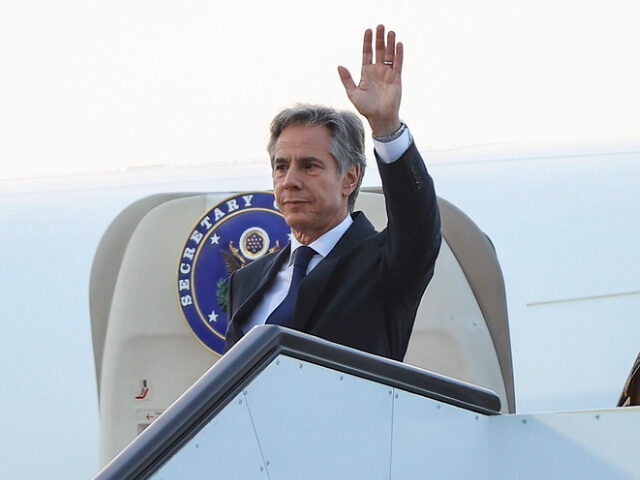Secretary of State Antony Blinken is scheduled to depart for a six-country tour of Asia on Thursday, an excursion China’s state-run Global Times snidely described as a “farewell trip,” as the administration of President Joe Biden slides into “garbage time.”
The use of “garbage time” to describe the current status of the Biden administration is interesting from a cultural standpoint because the Chinese Communist Party (CCP) officially loathes the term and has been trying to discourage its own subjects from using it.
“Garbage time” refers to the dejected slog at the end of a basketball game when one team cannot possibly win. Unhappy Chinese young people are talking about living in the “garbage time” of history because their economy is deflating, their communist political leadership is calcified, and their future looks glum. Chinese censors have been working overtime to delete online articles and social media posts referring to “garbage time.”
The Global Times seemed to take a certain glee in blowing the garbage time whistle on Biden and Blinken — as if the Chinese Communist Party might cheer itself up by musing that America might be in worse shape than China.
The Global Times also took some pleasure from the notion that Blinken was taking one last tour of Asia before the doorknob of the 2024 presidential election hit him in the posterior and suggests America’s Asian allies take a long, hard look at U.S. political chaos:
Blinken’s visit comes at a time when the US is experiencing significant internal political turmoil and chaos, Li Haidong, a professor at the China Foreign Affairs University, told the Global Times on Thursday.
“In fact, there are major contradictions and clashes between different US candidates on how to treat its allies, which brings great uncertainty to the future of US foreign policy,” Li said, noting that this will cause many countries, including those in the Asia-Pacific region, to doubt the credibility of the US and even become wary of it.
[…]
“Blinken is a typical representative of the U.S.’ two-faced diplomacy,” Lü Xiang, a research fellow at the Chinese Academy of Social Sciences, told the Global Times on Thursday. “This ‘farewell trip’ is unlikely to have much substantive content. In his meetings, including possible meeting with [Chinese Foreign Minister] Wang, he will likely just reiterate his previous positions.”
All of these “Chinese experts” agreed that the Philippines would be foolish to let Blinken convince it to stand up to China with American support. Lu Xiang sneered that the Biden administration was using its “garbage time” to trick the Philippines into mounting a suicidal challenge to Chinese power in the South China Sea and create other “crises, confrontations, and uncertainties” in the Pacific.
“Europe has been thrown into chaos by the Biden administration, and I believe that no European leader now trusts Biden, and the same goes for Asia. Who trusts Biden now?” Lu wondered.
Of course, the U.S. State Department did not speak of Blinken’s trip as a farewell tour. State Department spokesman Matthew Miller said on Wednesday that Blinken’s eighteenth trip to Asia would include stops in Laos, Vietnam, Japan, Singapore, the Philippines, and Mongolia. Secretary of Defense Lloyd Austin is scheduled to join Blinken in Japan and the Philippines for “2+2” security talks with the foreign and defense ministers of those countries.
Blinken is additionally scheduled to meet with officials from the Association of Southeast Asian Nations (ASEAN) during his trip.
Assistant Secretary of State for East Asian and Pacific Affairs Daniel Kritenbrink said the goal of Blinken’s trip was to build “an interlocking network of relationships, formal and informal, that advances our shared interests across the region.”
“When the secretary goes, he’ll demonstrate that we’re all in on ASEAN as an institution, and all in on our partnerships across the region,” Kritenbrink said at an American Enterprise Institute (AEI) seminar on Wednesday.
National Security Council (NSC) East Asia Director Mira Rapp-Hooper said:
It is essentially the creation of a new regional architecture that helps to reinforce the Indo Pacific against all manner of challenges, whether they’re coming from the PRC [China], the DPRK [North Korea], climate change, or any number of other threats and challenges.
Critics of the Biden administration who were a bit less critical than the Global Times suspected the more immediate purpose of Blinken’s tour was to reassure Asia that the Biden administration has not forgotten about it, consumed as it has been with the Russian invasion of Ukraine, the war in Gaza, and the implosion of President Joe Biden’s reelection campaign.
The State Department seems to be crossing its fingers that Vietnam, for example, will not take umbrage at Blinken missing the funeral for Communist Party Chief Nguyen Phu Trong. Blinken was supposed to attend, but his trip was delayed so he could be present during a meeting between Biden and Israeli Prime Minister Benjamin Netanyahu on Thursday morning.
Vietnam is poised between the Chinese and American spheres of influence — a veritable “swing state” of Southeast Asia, as State Department officials have described it, using a metaphor from U.S. elections. High-ranking official Wang Huning is scheduled to attend Trong’s funeral as China’s representative.
Another lingering bit of business in what could be Secretary of State Blinken’s last Asia trip is “expanded cooperation” in Japan’s Southwest Islands, which happen to end less than a hundred miles from Taiwan. Japanese coordination with U.S. forces in the region is bound to irritate Beijing by linking Japan more firmly to the defense of Taiwan.

COMMENTS
Please let us know if you're having issues with commenting.